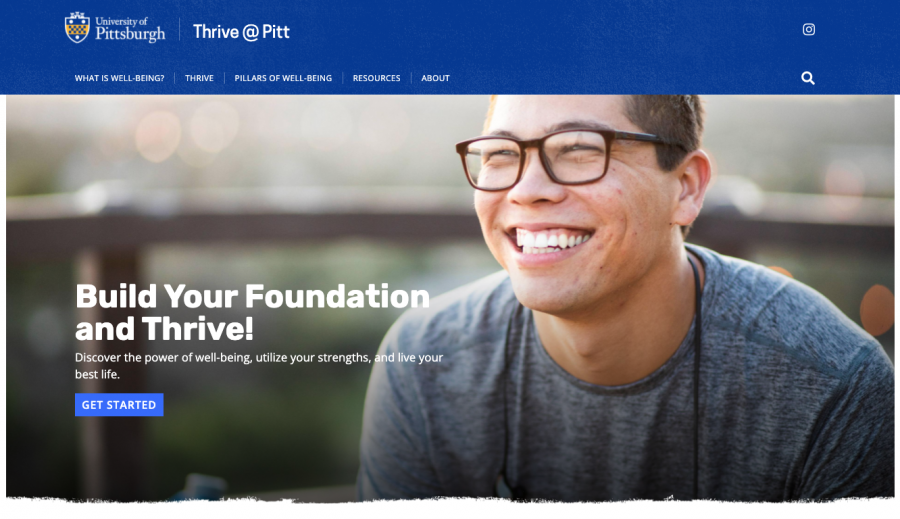Thrive @ Pitt website aims to connect students with well-being resources
Screenshot of Thrive @ Pitt webpage
Thrive @ Pitt was recently launched by the Campus Well-Being Consortium to connect students to well-being resources.
December 10, 2021
When the COVID-19 pandemic forced classes, orientations and events online, it exposed a “disconnect” between students and resources to support their well-being, according to Danielle Floyd, member of the Campus Well-Being Consortium.
“Even just relaying like, before you come back to campus you have to submit a COVID test was really hard information to just get students to know about,” Floyd, a junior economics major, said. “So you can understand how hard it was during that time to get students to know about, you know, the Counseling Center, things like that.”
According to Floyd, who is also a member of the Student Government Board, this gave the Campus Well-Being Consortium the idea to create Thrive @ Pitt — a comprehensive resource database with the mission of supporting and maintaining “all aspects of student well-being.” Departments and organizations participating in the well-being Consortium include the University Counseling Center, Campus Recreation, Residence Life, Disability Resources and Services, Student Mental Health Coalition, SGB and more.
“That’s kind of where the idea of Thrive @ Pitt came from, in terms of having like a one-stop shop that has different resources that can help with all different facets of well-being all in one place,” Floyd said.
The site currently divides its resources into eight “pillars,” or concentrations, of well-being. The pillars include emotional, physical, financial, social, spiritual, intellectual, occupational and environmental well-being.
Under each pillar, the website offers five related tips on ways to improve well-being, as well as links to and descriptions of related programs offered through Pitt. The site features resources ranging from tutoring and financial aid services, to local places of worship and instructions for how to get in touch with Pitt’s registered dietitian.
To Floyd, the path to improving well-being is an experience that is “unique” to each person. But no matter what it looks like, Floyd said she believes work to improve a student’s well-being should be a priority.
“I think a person’s path to improving their well-being is not the same as maybe like their roommate’s or their friend’s,” Floyd said. “I believe our personal satisfaction when it comes to our life is directly influenced by our own capabilities and accomplishments and in order to achieve those different goals, maximizing your well-being and taking care of yourself has to be a priority.”
Floyd said she hopes the site can serve as a starting place for students who may not know where to begin to improve their well-being.
“Some people don’t even know where to start when it comes to seeking out help, when it comes to trying to improve like whatever facet of well-being,” Floyd said. “I really would encourage students to look at Thrive @ Pitt to see these are the many different pathways you can take to improve this aspect of your well-being.”
Jason Miller and Bernadette Smith, co-chairs of the Campus Well-Being Consortium said maintaining well-being is important to having a successful life overall. Miller and Smith answered questions together through a Pitt spokesperson.
“Individuals who exhibit higher levels of health and well-being [generally] experience many positive benefits, such as greater success in school and the workplace, stronger relationships, increased optimism, confidence, happiness and satisfaction, better physical health and even longer lifespans,” they said. “Being aware of the areas that comprise well-being and the many ways in which it can be affected is crucial.”
Miller and Smith said the Consortium is “exploring ideas for new features and content” for the website and also plans to “take Thrive @ Pitt on campus” in the future through events, promotions and other in-person engagements.
According to Miller and Smith, the Consortium is “always looking for new resources” that support health and well-being and encourages both students and organizations to reach out to [email protected] with suggestions about additions to the website.
“It is a living website that we intend to grow, adapt and improve as more initiatives emerge and community partners join to support our mission,” they said. “Being a large University, we recognize that our current resource list should and will continue to grow as we learn about ongoing and new initiatives, programs and services.”








